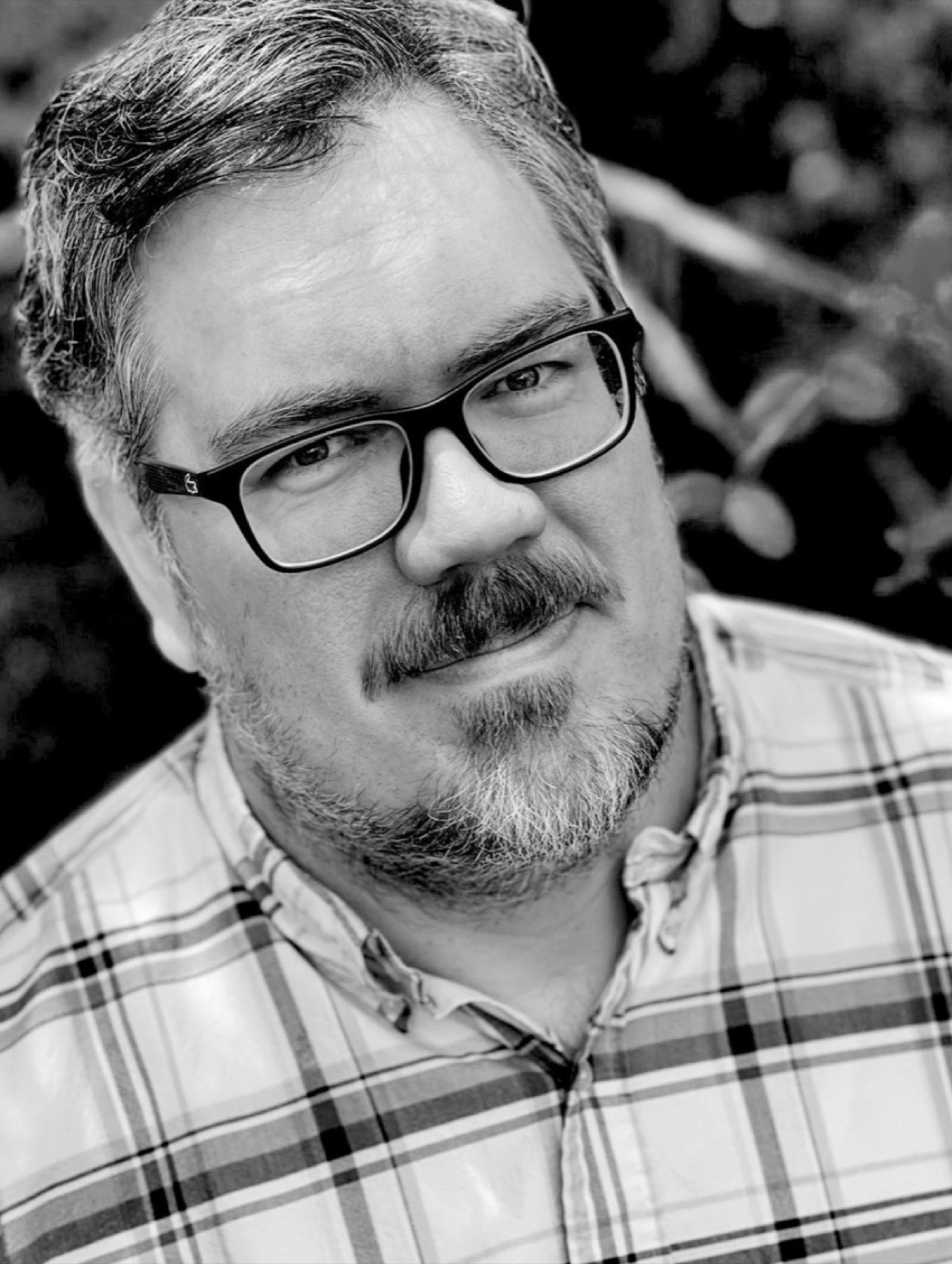MAGNIFYING is a series dedicated to showcasing the talent of our students, faculty, and staff to help you learn more about the remarkable individuals within our creative community here at the College of Fine Arts.
Hubbel Palmer, along with his writing partner Chris Bowman, is a recipient of Variety's annual "10 Screenwriters to Watch" award, and recently completed work for Warner Brothers and Legendary Entertainment on the screenplay for a film version of Minecraft, the most popular video game in the world.
The duo has enjoyed the distinction of having two of their movies in the box office top ten simultaneously: Masterminds, a southern-fried crime caper produced by Lorne Michaels and featuring an A-list roster of comic talent (including Zach Galifianakis, Kristen Wiig, Owen Wilson, Kate McKinnon, and Jason Sudeikis), and Middle School: The Worst Years of My Life, a "fun, rebellious romp" (LA Times) that "channels the spirit of John Hughes" (Hollywood Reporter). For the latter film, Bowman and Palmer were hand-picked by the world's bestselling novelist, James Patterson, to bring his passion project to the screen.
Palmer and Bowman were previously staff writers on the Fox animated series Napoleon Dynamite. Their collaboration began a decade ago on an independent feature, American Fork. The film was Bowman's directing debut; Palmer wrote the screenplay and starred as a small-town grocery clerk bitten by the acting bug. After picking up accolades at festivals such as Slamdance and AFI, the pair were selected by the U.S. State Department to travel the world as official cultural diplomats, screening American Fork on five continents.
Palmer, named "Hubbel" by his movie-buff parents after Robert Redford's character in The Way We Were, hails from Salt Lake City, Utah.
What were your interests as a young person? How did film find its way into your life?
I’d say it was my first interest. The first memories I have are of going to the movies. The first movie I remember seeing was called “The Incredible Shrinking Woman” with Lily Tomlin. I just remember being so caught up in the story, and captivated by it. As far as I can remember I just always wanted to do something with making movies or TV as a kid. My parents would try and talk me out of it. They both went to law school. That always felt like a realistic option and I held on to it for a while, but then I dove into film and never looked back.
So did you decide early on you would study film in college?
I had a moment where I considered, “Do I still want to do this film thing or should I do something that really matters?” I wanted to make a contribution. I thought maybe I would pursue Family Studies. There was one semester where I was signed up for two classes. One was intro to family studies, and one was film history. I went to one day of family studies and I was like, “No competition!” I dropped that class and signed up for another film class instead with the same teacher. It was like drinking from a film firehose. It was a compressed semester so I had class every day. I was watching six films a week and just loving it.
Were you making films too?
I made a few films as an undergrad, but I realized I was most interested in writing. I took a class from Paul Larsen (who now teaches at the U). That was the only class where we were looking at feature length films instead of shorts. And I thought, “This is what I really care about—I love short-format stuff, but I want to write movies.” In that class I wrote my first feature length screenplay and it got me so excited about writing that I ended up applying to graduate school in screenwriting, and went on to get my MFA from USC.
We obsess over structure. We spend weeks ironing out the story before we start writing scenes. We try not to be precious about anything--we don’t rest until each scene is as sharp as it can possibly be. Writing can be really hard work but we try and keep it light and fun.
You are also an actor – how does that play in with all this?
That was something I did a lot as a kid. I was in school plays. Any time there was an opportunity for a part that didn’t involve singing, I would try out. I was in several Shakespeare plays--I played Falstaff in “The Merry Wives of Windsor” my senior year of high school, which is sort of “Hamlet for the larger gentleman.” But when I was a freshman in college, I was going back and forth: “Do I want to study acting or film?” And I guess I identified more with the film students.
But you starred in a movie that you also wrote, right?
I had this story that I wanted to tell but I knew I didn’t want to direct it. But I wanted to be on set and involved, and I had written a character that I felt like I could play. I wanted to feel like I was creating the movie along with the director, and it seemed that acting in it was the best way for me to do that.
When you discovered you loved to write, to what kind of stories did you gravitate?
I wrote a sci-fi short in high school that was a variation on “Invasion of the Body Snatchers” – it was about what happens after the invasion. And then the first feature that I wrote in Paul Larsen’s class was an indie comedy in the vein of "Flirting with Disaster."
And what about “American Fork?”
I always had the idea floating around, because in high school I worked as a courtesy clerk at a local grocery store. I worked with a lot of interesting people. One guy in particular really intrigued me. He seemed like he’d been at the store forever and he would stay there long after the rest of us had moved on. So I based the main character on him.
How did you meet Chris Bowman and what makes your partnership last?
We were in the same film program as undergrads. He wrote and directed this short about a guy introducing his new fiancée to his best friend. And it turns out that the fiancée is a sock puppet. I remember thinking that was so weird and hilarious. And so, after I had written "American Fork," I was trying to think of people to direct it and he came to mind. I sent it to him. He liked the script but he had notes. But the thing was, every idea he had was spot on—I could tell it would make the film better. That’s rare. Usually people give you notes that feel like a creative compromise and you have to figure out how to make them work anyway.
So he ended up directing it, and after that we decided we liked working together and we said, “Hey, let’s write something together from the ground up.” And so we did. That led to us getting hired to write for this primetime animated TV show, and from there we had an opportunity to write a studio film, and it just kept snowballing. One thing that helps us work together is that we have very similar tastes. At the time, nearly everyone else in film school was into flashy auteurs. Fincher, the Wachowskis. Chris and I seemed to gravitate more toward the writing behind the movies—voices like John Patrick Shanley, Charlie Kaufman, Steve Tesich and Albert Brooks.
Can you talk a bit about your creative process of working on a screenplay?
We obsess over structure. We spend weeks ironing out the story before we start writing scenes. We try not to be precious about anything--we don’t rest until each scene is as sharp as it can possibly be. Writing can be really hard work but we try and keep it light and fun. If you let the pressure get to you, it only makes the process harder. We’re both perfectionists but in different ways and about different things. We complement each other.
Do you remember any major a-ha moments in your career?
When I was in film school I pictured a life as an indie filmmaker, making tiny film after tiny film. I looked down on my classmates who were writing commercial fare. Well, the truth was that studio writing intimidated me—I just didn’t think I could do it. But an opportunity presented itself and my writing partner and I rose to the occasion. It was an a-ha moment to realize, “Hey, we can do this.”
For students who have a big idea or story to tell, what advice do you have for how to gather the resources or team to make it happen?
I’d say you need to be able to discern between people who talk a big game, and people who can actually get stuff done. I remember trying to pick winners in college – like who was going to succeed. And I was often wrong. Maybe they had an outsized personality, or seemed really entrepreneurial, but they didn’t have ideas. But there were other people, quieter people, who would surprise you with incredible work. Try and find those people.
Where do you gather inspiration?
We always try and think of the movies that we’d like to see that don’t currently exist or that there aren’t enough of. We also have touchstone movies that we watch obsessively. One for me is this Wim Wenders film called “Faraway, So Close!” (That exclamation point is part of the title.) The critics really savaged it at the time, but I think it’s miraculous. I keep a poster of it in my office. I also have a poster of “Housekeeping”, a luminous adaptation of the Marilynne Robinson novel. I’m also inspired when I watch movies with my children, although I’m always sad when they don’t like something I treasure, or they get bored and wander out of the room. Every now and then, though, they have the exact reaction I was hoping for.

